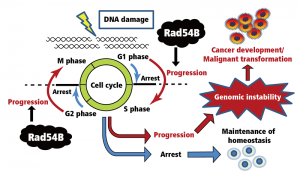Discovery of a basic mechanism of cancer development Novel cell cycle regulator in DNA damage response

Cancer is a disease involving uncontrolled cell growth caused by abnormalities in the genome. Mutations in tumour suppressor genes that function in cell-cycle regulation are frequently observed in many types of cancer. Accumulated evidence suggests that proper determination of cell fate after DNA damage is vital to maintain genome stability and suppress development of cancer. However, the mechanisms by which the cell fate is determined during the DNA damage response are poorly understood.

© 2014 Takaaki Yasuhara.
Regulation of the cell cycle in the DNA damage response. While mechanisms exist to arrest the cell cycle upon DNA damage, Rad54B instead inactivates the mechanism of cell cycle arrest and promotes cell cycle progression, thereby enhancing survival of the cells carrying genomic instability. The survival of such cells could be the first step of cancer development or malignant transformation of tumours.
The research group of graduate student Takaaki Yasuhara and Professor Kiyoshi Miyagawa at the Graduate School of Medicine, the University of Tokyo has identified Rad54B as a novel regulator of the cell cycle after DNA damage. Upon DNA damage, Rad54B inactivates the mechanism of cell cycle arrest and promotes cell cycle progression, thereby enhancing survival of the cells carrying genomic instability. The survival of such cells could be the first step of cancer development or malignant transformation of tumours. These findings suggest that Rad54B is involved in the basic mechanism of cancer development via regulation of the cell cycle after DNA damage. Thus, inhibition of Rad54B may be a feasible strategy for targeting the process of cancer development.
Press release (Japanese)
Paper
Takaaki Yasuhara, Takahiko Suzuki, Mari Katsura and Kiyoshi Miyagawa,
“Rad54B serves as a scaffold in the DNA damage response that limits checkpoint strength”,
Nature Communications Online Edition: 2014/11/11 (Japan time), doi: 10.1038/ncomms6426.
Article link (Publication, UTokyo Repository)
Links
Center for Disease Biology and Integrative Medicine, Graduate School of Medicine






